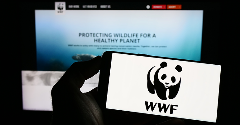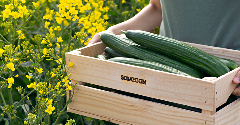News
How can brands improve the transparency of food supply chains? [Interview]
5 Oct 2022
Transparency is vital to ensuring food supply chains are effective, sustainable, and resilient. How transparent is the current global food system and what role do different stakeholders play in contributing to this? Sustainability expert Koen Boone explains.
Coordinator of sustainable value chains at Wageningen University and Research, Koen Boone is experienced in developing sustainability assessment systems on all levels, from product to company to farm. He will be speaking at Fi Europe this year on the topic ‘Transparency in the sustainability of food: Developments in public and private sector’.
Click here to register
![How can brands improve the transparency of food supply chains? [Interview]](/47/pdcnewsitem/11/89/36/Fi-Europe22_Speaker-Interview_Koen-Boone.png)
With the global population predicted to reach a staggering 9.7 billion by 2050, food production will need to increase by as much as 60% to meet this fast-growing demand, according to a United Nations report.
Ensuring that the nutritional needs of the growing global population are met in the long-term depends largely on our ability to create and uphold sustainable and transparent food supply chains. To do this, key stakeholders within the food industry, from regulators to corporates to consumers, will be required to collectively address a series of complex issues, of which a lack of transparency is at the core.
Transparency is essential, but is inconsistent between food supply chains
Shocks to the global food value chain brought on by recent socio-political events such as the Russo-Ukrainian war and the Covid-19 pandemic have highlighted just how integral transparency is to the sustainability of the global food supply chain. Improving the transparency of supply chains offers benefits for stakeholders across the value chain.
According to Boone, these benefits range from fewer inefficiencies, to improved communication and coordination allowing stakeholders to better respond to changes and shocks, to increased trust from stakeholders to name a few.
Although the advantages are clear, the process of improving the transparency of the food value chain is certainly not a one-sized-fits-all approach. Just exactly how transparent supply chains are varies significantly between countries, commodities, and stakeholders.
“Short national supply chains are most often very transparent but some international supply chains with many links are not transparent at all,” said Boone.
“Commodities from the southern part of the world are most often not transparent because they are shipped to Europe in huge volumes. Risks are also higher in these supply chains because the enforcement of regulation is not always good.”
The sustainability of food brands is a growing consumer concern
Brands too have a large part to play in influencing the transparency of the global food system. A recent Deloitte report found that sustainability is a crucial consideration for over one-third of consumers. As consumers grow increasingly aware of the sustainability credentials of brands and products, more pressure is being put on companies to improve the ways in which they produce, distribute, and circulate foodstuffs to consumers across the globe.
While some brands have been praised for their efforts to become more sustainable and responsible contributors to the food system, others have been caught up in sustainability scandals, accused of ‘greenwashing’ which, defined by the Cambridge Dictionary is ‘an attempt by companies to make people believe they are doing more to protect the environment than they actually are.’
“There are huge differences between companies. Some brands are making good progress. Others do not even pretend to be sustainable, and there is also the group that is mainly involved in greenwashing,” Boone said.
“I expect that both because of public and private initiatives that are starting up, which ask all food producers to report on the impact of their supply chains (for example, the Scope 3 Standard [as part of the] Greenhouse Gas Protocol), the second and third group will quickly diminish.”
In order to improve the sustainability and resilience of supply chains moving forward, there are a series of actionable steps that brands can take.
“Steps that are useful for all supply chains include: traceability, risk assessment and management, long term relations, short supply chains, focussing on hotspots, and setting quantified time bounded targets,” said Boone.
“The exchange of information about sustainability in the supply chain following a harmonised international reporting standard, as well as transparency around the sustainability of supply chains for all stakeholders [is important in ensuring supply chain transparency].”
What role do regulators play in improving supply chain transparency?
The role of regulators in establishing transparent supply chains is also crucial. Over recent years, the industry has witnessed growth in the amount of regulation surrounding the actions of corporates via-a-vis their sustainability and transparency practices.
Adopted in February 2022, the EU Directive on Corporate Sustainability Due Diligence seeks primarily to ensure large companies to implement sustainable and responsible corporate practices, built around a shared understanding of and respect for human rights and environmental considerations. The rules set out by the regulation will ensure that businesses take responsibility for the consequences of their actions, both directly, and more broadly, across the entirety of the value chain.
“For companies that do not have transparent supply chains and no good risk management policies, the influence [of the Directive] will be large. This is not the only relevant regulation, however. There are also the upcoming Green Claims Initiative, the Sustainable Food Labelling Framework, and the Corporate Sustainability Reporting Framework,” Boone said.
Due to the novelty of such initiatives, in many cases the effectiveness of these regulatory steps is yet to be seen. The question as to whether regulation will be enough to incite positive change in regard to the transparency of food supply chains is an interesting one.
“In my opinion, the preferred approach [for increasing the transparency of food sustainability] is to work on global or European level [to create] harmonised reporting standards […] that supply chain partners must use for reporting. Some national governments think that progress is too slow on these levels and […] in some countries, multistakeholder initiatives ([involving] government, businesses, NGOs, researchers) have started to develop these reporting standards,” Boone said.
“Communicating the sustainability of all individual food items to consumers is less advanced and therefore, multistakeholder initiatives on the national level might be a good step towards harmonised EU regulation.”
Related news

Soy story: WWF scores UK supermarkets on sustainability efforts
12 Nov 2025
WWF has published its latest “Soy Scorecard”, ranking UK supermarkets’ efforts to combat deforestation and land conversion in their soy supply chains.
Read more
Standing Ovation and Bel scale up casein production from dairy co-products
11 Nov 2025
Foodtech company Standing Ovation has partnered with cheese specialist Bel Group to manufacture dairy serums for industrial-scale casein production via precision fermentation.
Read more
New UPF standard hoped to offer consumers ‘coherence and clarity’
10 Nov 2025
Ingredients companies are being urged to enter “a new era of partnership and innovation” following the launch of the industry’s first non-UPF verification scheme.
Read more
Whistleblowers accuse UK meat industry of promoting cheap, unsustainable supply
7 Nov 2025
An anonymous group of industry insiders has accused the UK’s biggest food companies of systematically driving down meat quality and welfare standards.
Read more
Bord Bia presents Irish dairy ingredient suppliers at Fi Europe
6 Nov 2025
Dairygold Co-operative Society, The Carbery Group, and Ornua Co-operative: Meet with sustainable producers of Irish dairy ingredients at Food ingredients Europe 2025, Hall 7.2 Stand M18.
Read more
AI attraction means foodtech startups must ‘prove’ rather than ‘promise’
4 Nov 2025
Reports suggest that artificial intelligence (AI) is sucking investment from foodtech and agritech, but investors say the picture is complicated.
Read more
Penguin and Club bars no longer classed as chocolate
30 Oct 2025
Penguin and Club bars can no longer be classified as chocolate after the pladis-owned McVitie’s brands turned to cheaper alternatives amid the ongoing cocoa crisis.
Read more
Could plant-based protection replace plastic packaging?
29 Oct 2025
Swedish foodtech company Saveggy has launched an additive-free plant-based protection for cucumbers, offering a waste-free packaging solution for fruit and vegetables.
Read more
Does promoting protein content push up plant-based sales?
27 Oct 2025
Promoting the protein content of meat-free products is a more effective sales strategy than adding carbon labels, a study of UK bakery chain Greggs suggests.
Read more
Amazon Grocery launch aims to balance quality with affordability
22 Oct 2025
Global e-commerce giant Amazon has introduced a new private-label food brand, combining existing Amazon Fresh and Happy Belly products with new everyday items.
Read more